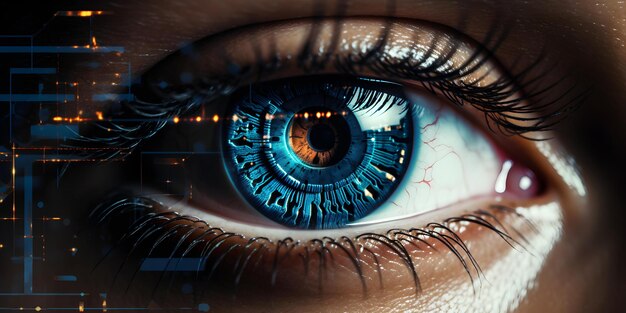Introduction
Facial recognition is such an important part of how we interact with each other and with modern technology-the way we connect, protect systems, and use equipment. Vision is a prime factor in identifying and processing facial features, and an alteration to eyesight has the potential to affect facial recognition. This blog explores the question: Do contact lenses affect facial recognition? In doing so, we will understand how such visual aids as contact lenses affect both human and artificial intelligence facial recognition systems.
How Humans Perceive and Recognize Faces
Facial recognition is a cognitive process that is complex in memory, perception, and focus. The brain identifies unique features such as eye shape, nose structure, and the relative positioning of features to recognize a face accurately. Visual clarity is crucial in this process.
Factors Influencing Facial Recognition Accuracy
Various aspects contribute to the way we perceive faces, including lighting, angle, and quality of vision. Aiding corrective tools such as glasses or contact lenses contribute significantly to better quality vision and, therefore affect the accuracy of facial recognition.
What Are Contact Lenses? Types of Contact Lenses
Contact lenses are thin, invisible devices applied directly to the eye’s surface to correct vision or for Cosmetic reasons: They come in:
- Corrective Lenses: This type is used to deal with conditions such as myopia or astigmatism.
- Cosmetic Lenses: Used to change the color or patterns of the eye.
- Specialty Lenses: Made for medical use or high-performance uses.
People have questioned the obstructive nature of contact lenses, despite their offering more open visibility compared to glasses. At the same time, impacts vary in terms of visual clarity and perception based on contact lens type and fit. These questions raise the important query of whether contact lens impact on facial features affects recognition accuracy.
How Contact Lenses Might Impact Facial Recognition
Visual Acuity and Clarity
This blog explores the question: Do contact lenses affect facial recognition? Corrective lenses enhance the clarity of one’s vision, which directly enhances recognition of facial features. However, poor-fit corrective lenses or those with deposition can distort vision, which can affect facial feature perception.
Colored or patterned cosmetic lenses may subtly alter the appearance of the eyes of the wearer, which might confuse facial recognition in human or artificial intelligence systems. The question is: Can facial recognition detect contact lenses effectively in such scenarios?
Cosmetic lenses, intended to alter the appearance, distort the perception of features such as the iris. This distortion may impact the accuracy of facial recognition in advanced security systems.
Scientific Research and Studies Evidence on Contact Lenses and Visual Processing
The literature indicates that corrective contact lenses improve global vision, but the quality of the fine facial details perceived depends on the lens and environmental conditions. Experimental Evidence Regarding Facial Recognition studies on AI systems show that sometimes facial recognition technology has lower accuracy in identifying people who are wearing certain types of cosmetic or patterned lenses. The findings suggest that the **impact of contact lenses on facial recognition technology** is indeed subtle.
Practical Implications
Daily Life Situations: Personal Life, Security, and Technology
In social situations, contact lenses are unlikely to interfere significantly with face recognition among familiar people but may be more problematic in less familiar settings. For example, individuals using face ID may ask: Does face ID work with contact lenses? The answer depends on the type of lens and system adaptability.
Impacts on Professional Settings
Even small changes such as those introduced by glasses or contact lenses might cause havoc in security and professional atmospheres where accuracy counts: some recognition systems or relationships, for example.
Comparing Eyeglasses vs. Contact Lenses in Face Identification
Differences between Ways of Correcting Eyes
Contact lenses have an unobstructed view compared to glasses; they reduce glare and peripheral distortions. In consequence, they are much better for maintaining facial recognition accuracy. On the other hand, glasses are possibly less susceptible to lens-specific issues such as dryness or deposits.
Effect on Facial Recognition
Glass often covers parts of the face, while contact lenses do not. This feature alone makes lenses better for use in scenarios that contain human and AI-based recognition.
Technological Context: AI and Facial Recognition Systems
How AI Recognizes Faces with Contact Lenses
AI systems operate based on algorithms that try to identify key features of the face, including the eyes. Corrective lenses rarely interfere, but colored or patterned lenses can trick AI models. This means that systems that can detect contact lenses are required.
Challenge in Automated Systems
AI-based facial recognition systems face challenges when contact lenses alter the iris’s appearance. This raises concerns about the reliability of such technology in high-security contexts.
Conclusion
Contact lenses have a bittersweet relationship with facial recognition. While corrective lenses usually offer clarity and improve the accuracy of recognition, cosmetic lenses can make matters complicated for both humans and machines. Overcoming these hurdles requires advancements in AI systems and awareness of how facial recognition technology interacts with contact lens wearers.








Leave a Reply